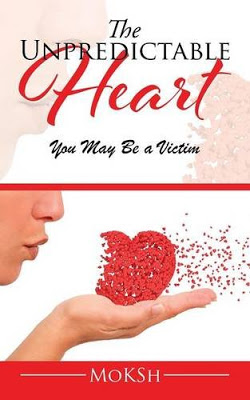Unpredictable Heart
Author: Moksh
Publisher: Partridge Publications
Rating: 2.5/5

This book, being a product of Partridge, had set high hopes in my mind. But the grammatical mistakes and the weak formation of sentences served as a recipe for disaster. However, I would like to compliment the author’s ability to present this piece of fiction in a language that can be understood by everyone. The organization of content is fine but the lack of twists and turns makes one’s mind wander every now and then. The two lead characters fail to complement each other.
Mrinav is apparently an introvert who likes to crack jokes and drools after every girl who comes in his life (quite contradictory to being an introvert, right?) Opposite to him is Jiya, who is smart yet sentimental. Their story surely leaves a lump in the throat but the climax was too filmy to be called as a cliffhanger. The narration is finely tuned and paced.
The plot is gripping but the major drawback lies in the extended content of the conversation where the protagonists try to express their feelings towards each other. Here, to be clearer, I would prefer quoting Doris Orens- ‘Not everything that you want to say, needs to be said.’ It is high time that the authors realize that penning down each and every minute detail that is either inspired or adapted from a personal experience, makes the story boring and can result in turning the odds against you. The book is more like a conversation and the story gets lost somewhere there. This book, no doubt, is a quick read and the reason for this is the presence of numerous dialogues.
The plot lacks originality. It is very much predictable and might be liked by the ones who prefer mushy love tales/ college romance. For the ones who are looking for something deep and meaningful, this book might or might not serve the interest.
Another point that I would like to highlight is the abrupt ending of the book. The book lacks proper editing and proofreading as one can encounter punctuation errors and the wrong formation of sentences- time and again. There is frequent use of Hindi words rather Hindi dialogues, which might act as a turn off for the ones who prefer reading rich literature.
There is a difference between how commas and periods are used (inside or outside quotation marks). In American English, they are generally used inside the quotation marks while in British English, they are generally used outside the quotation marks. This aspect has been completely ignored in this book. I hope it gets rectified in the second print of the book.
Best wishes!
Buying Link: Amazon